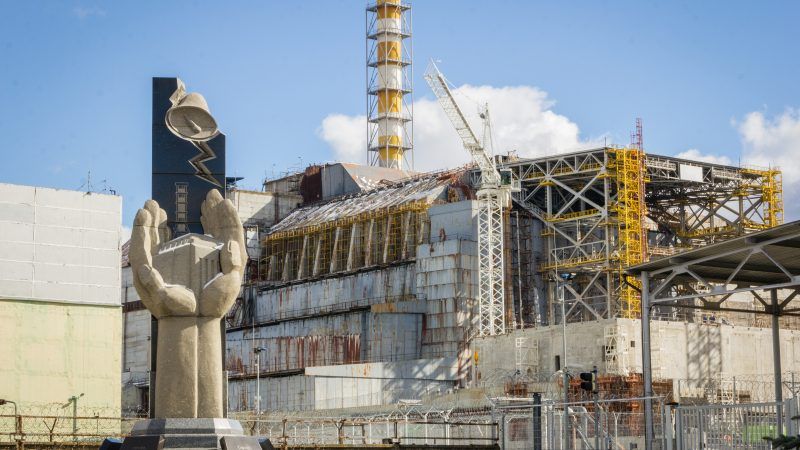Chernobyl Is About What Happens When Citizens Believe Telling the Truth Is Futile
The HBO series is a powerful portrait of the political and social rot that occurs in authoritarian regimes.

"You think the right question will get you the truth? There is no truth," Anatoly Dyatlov tells Ulana Khomyuk in last week's penultimate episode of Chernobyl. "Ask the bosses whatever you want. You will get the lie, and I will get the bullet."
It's a scene that perfectly captures the essence of HBO's a five-part miniseries, which concludes Monday night, about the aftermath of the 1986 nuclear disaster in the former Soviet Union. Khomyuk, the scientist who is trying to solve the mystery at the center of the story—why did the nuclear reactor at the titular power plant seemingly inexplicably explode during a routine safety test—has been stonewalled by the Soviet government and most of the eyewitnesses have already died. Dyatlov, who was in charge of the plant on the night of the accident, is perhaps the only person who can connect the dots for her.
He's unwilling to talk. It's not self-preservation—though he is paranoid that she is helping the Soviet government pin the blame for the accident solely on him, he also figures he's doomed one way or the other. It's hopelessness. The truth doesn't matter and won't be heard. Why risk telling it?
Chernobyl is a story about the cost of lies. Big ones like the flaw in the design of the plant's reactor that was left unfixed because admitting a mistake would make the USSR seem less technologically awesome. Smaller ones like the deliberately inaccurate radiation measurements that the Soviet government published to make the accident look less serious, but that ended up putting more people in harm's way. But the strength of the story—and the true horror at the center of Craig Mazin's gripping script—is how it examines the political and social rot that occurs when individuals become convinced that telling the truth is futile.
"The official position of the state," Boris Shcherbina, the Soviet official sent to Chernobyl to oversee the clean-up, remarks at one point, "is that global nuclear catastrophe is not possible in the Soviet Union."
Shcherbina, played masterfully by Stellan Skarsgård, is perhaps the character most affected by seeing that rot up close. At the outset, he's deputy chairman of the Soviet Council of Ministers and the ultimate party yes-man. He's sent to Chernobyl, essentially, to keep a lid on the clean-up effort and make sure the scientists brought in to solve the crisis stick to the party line. By the end of the fourth episode, he's so frustrated with his own government that he's screaming at his superiors over the phone one minute and smashing the phone with his bare hands the next.
In other words, he evolves from someone who could deliver the "official position of the state" with a straight face to someone who, when he does utter that phrase, delivers it with all the wryness it deserves.
Chernobyl is a powerful indictment of the Soviet state—and, indeed, even Mikhail Gorbachev has claimed that the nuclear disaster was partially responsible for the collapse of the USSR. A system built on lies about equality and prosperity collapsed once enough people, like Shcherbina, became disillusioned with the state-sanctioned truth.
To be sure, all governments lie and engage in cover-ups. The Soviet Union may have been more ruthlessly efficient at it than most, but America covered up details about the Challenger disaster, for example, in part to save face after a technologically humiliating disaster, much like the Soviets did after Chernobyl. The United States tried to hide inhumane medical testing conducted on African Americans, covered up the testing of chemical weapons on an urban neighborhood in St. Louis, and concocted a fictional rationale for a war that destabilized the entire Middle East and killed hundreds of thousands.
If you're looking for the cost of governmental lies, history is full of them and their associated body counts. If the Soviet Union had a monopoly on those sorts of lies, Chernobyl wouldn't strike the same chord. It would be a historical drama, not a parable. It works as a warning about how a government dedicated to telling untruths can succeed, even at great cost, when there is no free press or open internet to contradict that narrative.
Still, the bleakest and most memorable moments in Chernobyl are rooted in a hopelessness that grows from decades of authoritarianism. The fourth episode, the best one in the series so far, opens with an old woman milking her single cow while being told by a Soviet soldier that she has to evacuate.
Decades of lies weigh heavily on her. "No," she says, repeatedly. After a lifetime that included close calls with Bolshevik revolutionaries, German soldiers, and Stalin's famines, each bringing their own lies to her doorstep. Why should she believe that the state is looking out for her best interest now? There will always be "more soldiers, more famine, more bodies."
In the end, her cow gets the bullet.
The soldier is actually right, of course, that she should evacuate to save her life, but the old woman—like Dyatlov, and like so many of her countrymen—is worn down by the absence of truth.


Show Comments (71)